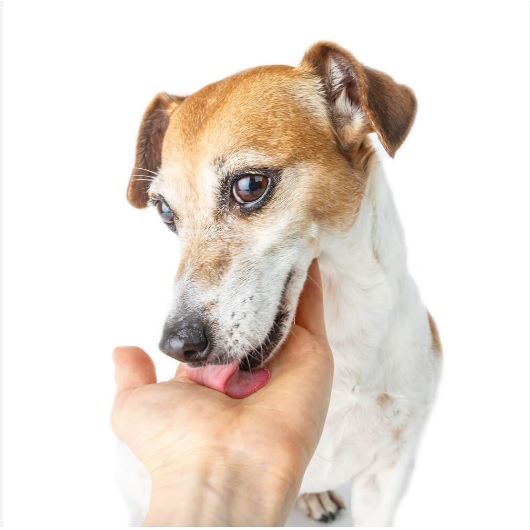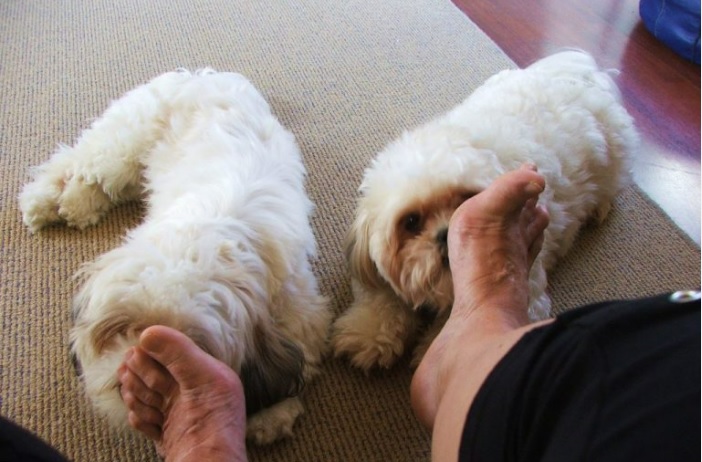Dog Lick My Feet In the intricate dance of human-canine relationships, our furry companions often find unique ways to communicate with us. One such behavior that can both amuse and bewilder dog owners is when their canine friends decide to shower their feet with affectionate licks. While this act may seem trivial at first glance, it holds a deeper meaning in the realm of canine behavior.

Understanding why dog engage in this particular behavior is essential for building stronger bonds and ensuring their overall well-being. The act of a dog licking a person’s feet symbolizes a desire for connection and communication. By exploring the reasons behind this behavior, we can unravel the complexity of our four-legged friends’ motivations.
From expressing affection and bonding to seeking attention or mimicking pack dynamics, there are various factors that contribute to dog engaging in this seemingly peculiar habit. This article aims to delve into the multifaceted nature of why dogs lick our feet. By examining scientific research, expert insights, and real-life experiences, we will explore the different meanings behind this behavior and provide guidance on how to address excessive licking if necessary.
So sit back, relax, and let us embark on a journey into the fascinating world of canine communication through foot licking.
Key Takeaways
- Dogs lick human feet for various reasons, including gathering information through scent recognition and establishing familiarity.
- Licking feet can be a grooming behavior rooted in dogs’ instincts and a form of tactile communication between dogs and their owners.
- Licking releases endorphins in dogs’ brains, resulting in pleasure and contentment, and can serve as a self-soothing technique and provide stress relief.
- Excessive licking in dogs may indicate underlying health issues and should be monitored, with consultation with a veterinarian recommended if the behavior persists.
The Significance of Licking in Canine Behavior
The act of licking in canines serves as a behavioral display with various potential underlying motivations.
One significant reason why dogs lick human feet is scent recognition. Dogs have an incredible sense of smell, and by licking our feet, they are able to gather information about us through the scents that we emit. This behavior allows them to establish familiarity and bond with their owners.

Another possible motivation for this behavior is related to grooming rituals. Licking is a natural grooming behavior for dogs, and by licking our feet, they may be attempting to groom us as part of their instinctual behavior.
It’s important to note that while some dogs may engage in this behavior out of affection or seeking attention, it can also indicate anxiety or stress in others. Understanding the significance of licking in canine behavior can help pet owners better interpret their dog’s actions and respond accordingly.
Expressing Affection and Bonding
Expressing affection and bonding, this behavior can be seen as a form of tactile communication between canines and their human companions. Dogs use licking as a way to establish a connection with their owners and express their emotions.

By licking feet, dogs are engaging in a behavior that is rooted in their natural instincts. It is believed that dogs perceive the saltiness and sweatiness of human feet, which may attract them due to its appealing taste or scent. Additionally, licking releases endorphins in dogs, creating a pleasurable experience for them.
This act of bonding through touch reinforces the emotional connection between humans and their canine companions. It serves as a way for dogs to show love, trust, and loyalty towards their owners while also seeking attention and affection in return.
Sensory Exploration and Taste
Sensory exploration and taste play a significant role in canines’ inclination to engage in licking behaviors towards their owners, as they are drawn to the unique flavors and scents emitted by human feet. Dogs possess an incredibly acute sense of smell, which allows them to detect even subtle odors that humans may not be aware of.
The act of licking provides dogs with a way to thoroughly explore and gather information about their environment, including the tastes and smells emanating from their owner’s feet. This behavior also serves as a form of sensory stimulation for dogs, providing them with mental satisfaction and a sense of comfort.

Additionally, licking can release endorphins in dogs, creating a pleasurable sensation that further reinforces the behavior. Overall, sensory exploration through taste is an inherent instinct in canines that contributes to their affinity for licking their owner’s feet.
- Canine curiosity: Dogs have an innate curiosity to investigate different scents and flavors present in their surroundings.
- Pleasure-seeking behavior: Licking releases endorphins in dogs’ brains, resulting in feelings of pleasure and contentment.
- Sensory satisfaction: Engaging in tactile interactions like licking provides mental stimulation for dogs while satisfying their sensory needs.
These emotional triggers aim to evoke empathy from the audience by highlighting the dog’s natural instincts and desire for sensory fulfillment when engaging with humans.
Seeking Attention or Communication
Communication through licking is a behavior exhibited by canines in order to seek attention or convey a message. Dogs have different ways of communicating with humans, and feet can be one of them. While it may seem unusual to us, it is important to understand the canine body language and the context in which this behavior occurs.

Dog Lick my feet could be a way to show affection, seek reassurance, or simply get attention from their owners. It is essential to recognize that each dog is unique and may have different reasons for engaging in this behavior.
In terms of addressing this behavior, training techniques can be implemented to redirect the dog’s attention towards more appropriate forms of communication. Positive reinforcement methods such as rewarding desired behaviors and providing mental stimulation can help dogs learn alternative ways to seek attention and communicate their needs effectively.
Understanding the underlying motivations behind foot licking can lead to better communication between dogs and their owners, fostering a stronger bond based on trust and mutual understanding.
Mimicking Pack Behavior and Social Hierarchy
Mimicking pack behavior and social hierarchy, canines may engage in licking behaviors to establish dominance or submission within their group. This behavior is deeply rooted in their ancestral instincts, where pack members rely on clear communication to maintain order and harmony. serves as a grooming ritual that not only keeps the pack clean but also reinforces bonds and social status.

Here are four reasons why dogs lick feet:
- Establishing Dominance: By licking the feet of their owners, dogs may be asserting their dominance over them.
- Submission: Dogs may also lick feet as a sign of submission to show respect and deference to their human companions.
- Grooming Ritual: Mimicking the grooming habits seen in wild packs, dogs may view foot-licking as a way to care for their pack members.
- Bonding: Licking feet can be an intimate act that strengthens the bond between dog and owner, promoting feelings of trust and affection.
Understanding these underlying motivations behind foot-licking can help dog owners better interpret and respond to this behavior in a positive manner.
Self-Soothing and Stress Relief
Self-soothing and stress relief are important functions that foot-licking behavior can serve for canines. Dogs may engage in this behavior as a means of self-soothing, much like humans who engage in activities such as nail biting or hair twirling. By their own feet, dogs can redirect their focus away from any anxiety or stress they may be experiencing, providing themselves with a sense of comfort and relief.

This self-soothing technique allows them to regulate their emotions and calm themselves down in times of distress. However, it is crucial to note that foot-licking should not be the sole method of stress relief for dogs. Providing alternative stress relief methods such as interactive toys, puzzle feeders, or engaging in physical exercise can help promote overall well-being and reduce excessive licking behaviors.
Nutritional or Salt Cravings
Dogs may also lick their owner’s feet as a result of nutritional or salt cravings. It is believed that dogs, like humans, have the ability to detect mineral imbalances in their bodies. If they are lacking certain essential minerals, such as sodium, they may seek out sources of salt to fulfill this deficiency.

This behavior can be further reinforced through behavioral conditioning. If a dog receives attention or positive reinforcement when licking their owner’s feet, they may continue to engage in this behavior as a means of seeking rewards or attention. However, it is important to note that excessive can also indicate an underlying health issue and should be monitored closely.
Providing a balanced diet for your dog and consulting with a veterinarian can help address any potential nutrient deficiencies and minimize excessive licking behavior.
Medical Issues or Discomfort
One possible explanation for the behavior of licking their owner’s feet is related to medical issues or discomfort. Dogs may lick their owner’s feet as a way to alleviate certain medical conditions or discomfort they may be experiencing.

It is important for owners to be aware that excessive lick can be a sign of underlying health issues. Medical conditions such as allergies, skin infections, or dermatitis can cause itchiness and discomfort, leading dogs to seek relief by licking their feet.
Additionally, dogs may also engage in this behavior due to hygiene concerns. They have an instinctual drive to keep themselves clean, and if they detect an unusual scent or residue on their owner’s feet, they may attempt to remove it through licking.
Therefore, if a dog persistently licks their owner’s feet excessively, it is recommended to consult with a veterinarian to rule out any potential medical issues and ensure the dog’s well-being.
Past Experiences and Conditioning
Previous studies have suggested that medical issues or discomfort can be a possible explanation for dogs licking their owners’ feet. However, another important factor that contributes to this behavior is past experiences and conditioning.

Dogs are known to learn through association and repetition, and if they have had positive experiences while licking their owner’s feet in the past, they might continue to engage in this behavior. This is known as conditioning effects, where dogs develop behavioral responses based on previous experiences.
Furthermore, it is worth mentioning that some dogs may lick feet as a way of seeking attention or displaying affection towards their owners. It is essential for dog owners to understand these factors and provide appropriate training and guidance to modify this behavior if it becomes undesirable or uncomfortable for them.
Addressing and Redirecting Excessive Lick Behavior
To explore effective strategies for addressing and redirecting excessive licking behavior in dogs, it is important to consider the underlying motivations behind this behavior. Dogs may lick their owners’ feet due to a variety of reasons, including seeking attention, displaying affection, or simply exploring their environment. However, if the licking becomes excessive or bothersome, it is essential to address and redirect this behavior.

Understanding the underlying causes of excessive licking can help in finding appropriate solutions. One strategy is to provide alternative outlets for the dog’s need for attention and exploration. This can include engaging in interactive play sessions or providing stimulating toys that keep them occupied. Additionally, positive reinforcement techniques can be used to reward desired behaviors while ignoring or redirecting unwanted licking.
Table: Strategies for Addressing Excessive Behavior
| Strategies | Description |
|---|---|
| Provide alternatives | Offer alternative activities such as interactive play sessions or stimulating toys |
| Positive reinforcement | Use rewards and praise to reinforce desired behaviors while ignoring or redirecting unwanted licking |
| Consistency | Establish consistent rules and boundaries to help the dog understand what behaviors are acceptable |
By understanding the underlying causes of excessive licking and implementing these strategies, pet owners can effectively address and redirect this behavior in their dogs.
Frequently Asked Questions
How often should I let my dog lick my feet?
To ensure the well-being of your pet, it is recommended to discourage dogs from licking feet by training them not to engage in this behavior. Some dogs may prefer certain body parts due to individual preferences or a particular scent.
Can dogs get sick from licking feet?
Dogs can potentially contract certain illnesses from licking feet, as they may be exposed to bacteria and fungi. The reasons behind foot lick in dogs include natural grooming behaviors, attention-seeking, or possible medical issues that merit veterinary evaluation.
Is it normal for a dog to lick feet when they are anxious?
Dog lick behavior can be a manifestation of anxiety. Dogs may lick their feet when anxious due to self-soothing or seeking comfort. Various reasons contribute to anxious behavior in dogs, including environmental factors and past experiences.
Should I be concerned if my dog only licks my feet and not other body parts?
Foot fetish: Exploring the psychology behind dogs’ preference for licking feet. Boundaries and training are essential in teaching dogs to respect personal space and reduce foot licking behavior.
What are some ways to prevent my dog from licking my feet excessively?
One interesting statistic is that 42% of dog owners report their dogs excessively licking their feet. To discourage this behavior, provide alternative behaviors such as chew toys and engage in regular exercise to redirect their attention.
See Also:
Conclusion
dog licking is a natural behavior that serves various purposes and can have different meanings. Dogs may lick humans, objects, or themselves as a way to communicate, show affection, seek attention, or alleviate stress. It can also be a self-soothing behavior or a way to explore their environment. However, it’s important to observe the context and frequency of licking to ensure it remains within healthy boundaries.
Support bonevoyagedogrescue and be a hero for homeless dogs in need.
